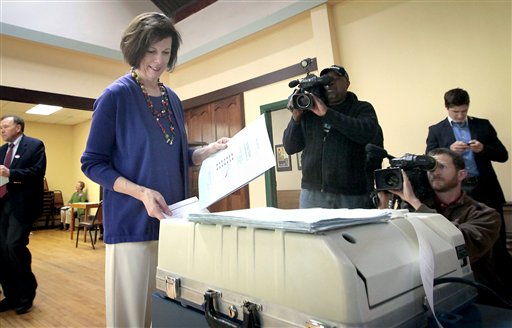(AP) Milwaukee mayor to face Walker in Wis. Recall
SCOTT BAUER
Associated Press
MADISON, Wis.
Milwaukee Mayor Tom Barrett won the Democratic primary Tuesday in Wisconsin’s historic recall election, leaving him with a short four weeks to make the closing argument that Republican Gov. Scott Walker should be booted from office after 16 contentious months on the job.
Walker easily defeated token opposition in the GOP primary Tuesday, and Barrett’s win set up a June 5 rematch of the 2010 governor’s race.
That election two years ago failed to hint at the turmoil to come. Once inaugurated, Walker almost immediately joined with Republicans who had also retaken control of the Legislature to strip most state workers of their collective bargaining rights. The move blindsided Walker’s opponents, who proceeded to pack the state Capitol by the thousands for weeks of protest as Democratic lawmakers fled the state in an ultimately unsuccessful effort to block the newly minted governor’s plans.
Walker emerged from the fight as a hero to Republicans nationwide, but a villain to unions and Democrats who responded by collecting more than 900,000 signatures to put Walker back on the ballot less than two years into his four-year term.
Walker told his supporters Tuesday that the choice in the recall is to move ahead with his initiatives that he said are putting the state in a better position to succeed or revert to what he called the failed policies of Democrats.
Walker’s deputy campaign manager Dan Blum issued a statement saying Barrett was about to enter his “third statewide losing campaign.” Barrett also ran for governor in 2002 and lost in the Democratic primary.
Carl Schramm, 77, a Whitefish Bay man who works part time for a plumbing and heating contractor voted for Walker in the primary.
Based on preliminary results, Barrett got 55 percent of the vote in the Democratic primary. Former Dane County Executive Kathleen Falk, who was the favored candidate of the unions that pushed the recall, came in second with 37 percent of the vote.
Union leaders said they were ready to quickly pivot and summon support for Barrett.
Barrett has had a rocky relationship with unions over the years and some Wisconsin union leaders urged him not to get into the recall race. He has promised to work toward restoring collective bargaining rights Walker took away, but he didn’t go as far as Falk, who pledged to veto any state budget that didn’t undo Walker’s changes.
Still, numerous unions that had backed Falk _ including the statewide teachers union and the largest state employee union _ issued statements praising Barrett and pledging their support.
While the union fight spurred the recall, the campaign has been much broader and focused largely on Wisconsin’s economy. Though the state’s unemployment rate is at its lowest level since 2008, Wisconsin lost more jobs than any other state between March 2011 and March 2012. Since Walker took office, only 5,900 private sector jobs have been created.
Jon Dzurak, a 55-year-old assistant principal in Milwaukee, said he initially was leaning toward Falk but decided to vote for Barrett because he was up in the polls and projected to fare better against Walker.
Other Democrats on the ballot finished far behind. State Sen. Kathleen Vinehout got 4 percent while Secretary of State Doug La Follette trailed with 3 percent. Gladys Huber, the fake Democrat, got less than 1 percent.
Walker easily defeated Arthur Kohl-Riggs, a Walker opponent running as a Republican.
The June 5 recall is one of the most closely watched elections in the nation outside of the presidential race. Walker has tapped his status as a national conservative rock star to raise $25 million so far, most of it from out of state, shattering fundraising records he set during the 2010 race.
Walker has embodied the Republican rise to power in 2010 and hopes to avoid becoming just the third governor to be recalled in U.S. history.
Barrett, 58, has been mayor of Milwaukee since 2004. He’s popular in Wisconsin’s largest, and mostly Democratic, city. He won re-election in April with 70 percent of the vote. Walker beat him by 5 percentage points, or about 125,000 votes, in November 2010.
Barrett previously served eight years in the state Legislature and 10 years in Congress.

COMMENTS
Please let us know if you're having issues with commenting.